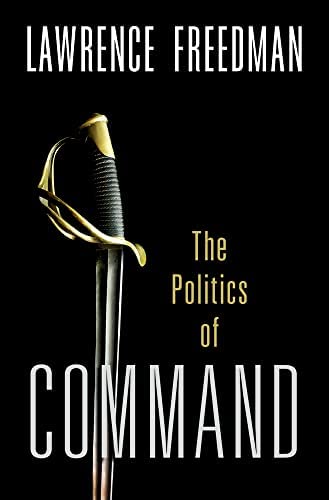
With the national obsession with the Chinese spy balloon, I thought a book like Lawrence Freedman’s Command fits right into the tenor of our times with political paranoia and conspiracy theories.
Lawrence Freedman, a specialist in Strategy, delivers a comprehensive volume on leadership, strategy, tactics, and command. Freedman’s chapter on the future of command focuses on the War in Ukraine. The Russian Army, poorly trained, poorly equipped, and expecting an easy victory in Ukraine found savage fighting, mounting losses, and imploding morale in Putin’s War. Freedman points out that the Russian Army doesn’t have noncommissioned officers like the American Army does. The orders from the Russian Generals travel down the Chain of Command and mostly go unexecuted because of the Fog of War. Once circumstances go South, Russian troops don’t know what to do. Confusion reigns and the losses mount. That’s because Command fails in the Russian/Ukraine setting. The result is battlefield causalities and retreat.
Command (2022) is a brilliant book filled with insights from the military campaigns over the past 70 years. Technology has changed the way wars are fought. It’s also changed the Command Structure of most advanced military units. Failure to adapt to these changes results in the mess the Russians created in Ukraine. China would do well to consider the costs of war before they contemplate an invasion of Taiwan. GRADE: A
TABLE OF CONTENTS:
1: Introduction: The Politics of Command
2. Commanding Supreme Commanders: Korea and Kosovo
3: The Fury of the Legions: The French Army in Indochina and Algeria
4; Keeping Control: The Cuban Missile Crisis
5: The Surrender of East Pakistan
6: The Easter Offensive
7: Model of Insubordination: Ariel Sharon
9: The Falklands Campaign
10: Guevara, Kabila and the Congo
11: Russian Rebellions: Chechnya and Ukraine
12: Saddam Hussein
13: Osama Bin Laden Escapes: The Battle of Tora Bora
14: Surging in Iraq
15: Past, Present, and Future of Command
Notes
Index
The Germans in WWII had a similar problem! Small units were not allowed to show initiative and had to wait until orders came down the chain from high ranking officers! It cost them dearly!
Bob, command and control structures need to be flexible or disaster results!
Freedman is what scholars and academics refer to as a “sharp cookie” and I find his observations well-reasoned and quite readable.
Dan, “sharp cookie” fits Lawrence Freedman perfectly! I love Freedman’s STRATEGY: A HISTORY, too!
There’s a slim chance that the other fascist countries in the world might learn something from the further Russian invasion of Ukraine, but I doubt it will be soon…after all, Russia’s been occupying some of Ukraine for years…though China has held off on actually trying to overrun Taiwan again for quite some time…initiative in the military isn’t too welcome to the fascist brain, I suspect.
Todd, the Chinese have growing economic and social problems. I’m not sure getting into a war with Taiwan would improve things.
Meanwhile, Daddy Warbucks is Always up for certain initiatives.
https://theintercept.com/2023/02/03/china-americas-frontier-fund/
–WHITE HOUSE-LINKED VENTURE CAPITAL FUND BOASTS CHINA WAR WOULD BE GREAT FOR BUSINESS
A representative from America’s Frontier Fund said that a “kinetic event” in the Pacific would be very good for its bottom line.
War is almost always good for business, Todd, which may be why we have so many of them,
Jerry, I agree completely.
Todd, many millionaires were made during the U.S. Civil War. And Eisenhower warned against the “military-industrial complex.” Plenty of winners–and losers–in war.
Not news, alas. Hence such creatures as Daddy Warbucks in even such relatively odd and old popular culture as LL’L ORPHAN ANNIE.
In college I took classes in the Vietnam War, WW One, World War 2, Nazi Germany, and Greek and Roman history. I hoped knowledge would explain war but it didn’t.
Patti, part of war is irrational. Putin didn’t think the Ukraine War through. He just thought his military forces would roll over the Ukrainians. Wrong!
Well, that and he wanted an excuse to ratchet down on domestic opponents, beyond the derault I Don’t Like You.